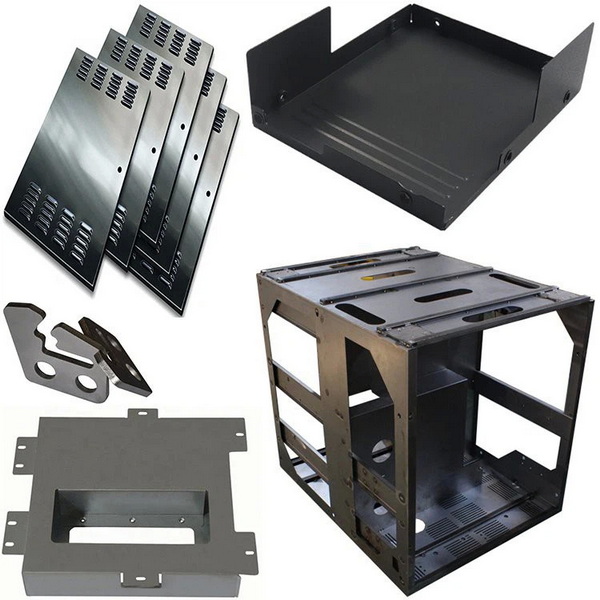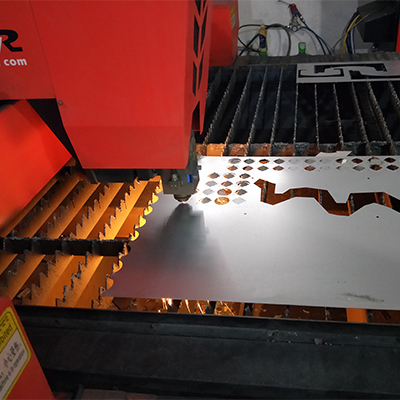
Views: 222 Author: Amanda Publish Time: 2025-09-09 Origin: Site








Content Menu
● Understanding Sheet Metal Fabrication
>> Why Sheet Metal Fabrication Matters across Industries
● Key Factors to Consider When Choosing a Sheet Metal Fabrication Service
>> 1. Industry-Specific Expertise
>> 2. Range of Fabrication Capabilities
>> 3. Advanced Technology and Equipment
>> 4. Material Selection and Sourcing
>> 5. Quality Assurance and Certifications
>> 6. Prototyping and Small Batch Capabilities
>> 7. Production Capacity and Lead Time
>> 8. Cost Transparency and Pricing Structure
>> 9. Communication and Customer Support
● How Industry Needs Influence Your Sheet Metal Fabrication Choice
>> Electronics and Electrical Industry
>> Construction and Architecture
● Additional Considerations When Choosing a Sheet Metal Fabricator
>> Environmental and Sustainability Policies
>> Capabilities for Complex and Custom Designs
>> After-Sales Support and Repair Services
>> Logistic Support and Delivery Options
● The Role of Rapid Prototyping and 3D Printing in Sheet Metal Fabrication
● FAQ
>> 1. What materials are commonly used in sheet metal fabrication?
>> 2. How do I know if a fabricator is capable of meeting my industry standards?
>> 3. What is the typical lead time for sheet metal fabrication projects?
>> 4. Can sheet metal fabrication services handle both prototyping and large-scale production?
>> 5. How is quality ensured during sheet metal fabrication?
Sheet metal fabrication is an essential process for many industries, including automotive, aerospace, electronics, construction, and manufacturing. Selecting the right Sheet Metal Fabrication service impacts product quality, production speed, cost efficiency, and ultimately, your business success. This comprehensive guide will walk you through everything you need to know to choose the best sheet metal fabrication partner tailored to your industry's unique requirements.

Sheet metal fabrication involves cutting, bending, and assembling thin metal sheets into desired shapes and structures. The process incorporates various techniques such as laser cutting, CNC punching, bending, welding, stamping, and finishing. Specialized equipment combined with skilled labor is critical to ensuring precision, durability, and consistency in the final products.
Sheet metal fabrication enables the creation of complex metal parts with tight tolerances and diverse applications. Whether producing automotive chassis parts or electronic enclosures, fabricated sheet metal components are indispensable. Good fabrication services ensure:
- High precision and tolerance adherence,
- Materials optimized for strength and weight,
- Cost-effective production,
- Rapid prototyping capabilities,
- Scalability from prototypes to large production runs.
Selecting the right service provider demands thorough evaluation of several vital aspects:
Different industries require specific knowledge about materials, standards, and certifications. For instance, aerospace fabrication demands tight aerospace-grade tolerances and certifications like AS9100, whereas food processing equipment fabrication needs stainless steel compliance and sanitary finishes.
Choose a sheet metal fabrication partner with a proven track record relative to your industry. They should understand your regulatory constraints, material specifications, and delivery timelines.
A comprehensive sheet metal fabrication service should offer a wide range of processes such as:
- CNC laser cutting,
- CNC bending and press braking,
- Welding (MIG, TIG, spot welding),
- Stamping and punching,
- Surface finishing (powder coating, anodizing).
Having all these capabilities under one roof reduces lead times, improves quality control, and streamlines communication.
The use of the latest fabrication technologies and equipment enhances precision, reduces errors, and enables complex geometry fabrication. Look for services using:
- CNC-controlled machines,
- Fiber laser cutting,
- Automated bending lines,
- 3D CAD/CAM integrated programming.
Modern equipment also supports faster prototyping and high-volume production without sacrificing quality.
An excellent fabricator should offer a variety of metals including stainless steel, aluminum, carbon steel, copper, and specialty alloys. They must also provide guidance on choosing optimal materials to balance cost, strength, corrosion resistance, and manufacturability.
Reliable sourcing ensures raw material availability and consistent quality throughout your project lifecycle.
Quality is paramount in sheet metal fabrication. Your partner should have robust quality control processes and certifications such as ISO 9001. They should provide:
- Detailed inspection reports,
- Material traceability,
- Non-destructive testing (NDT) methods,
- 100% dimensional inspection with CMMs (Coordinate Measuring Machines).
Before large-scale production, prototyping verifies design functionality and fit. A good fabricator offers quick turnaround for prototypes and low-volume batches. This also helps minimize costly design changes down the line.
Check the fabricator's capacity to meet your volume demands reliably within deadlines. Capability to scale from prototype to full production is important as your project grows.
While cost is important, the cheapest option isn't always the best. Look for transparent pricing that includes setup, tooling, materials, labor, secondary operations, and shipping. A detailed quotation helps avoid surprises.
Effective communication throughout the project—from design consultation to delivery—increases efficiency and reduces errors. Choose a fabricator which assigns dedicated project managers and offers timely updates.

The automotive sector demands high-strength, lightweight components with consistent repeatability. Look for fabricators experienced with materials like aluminum and advanced high-strength steels. Certifications such as IATF 16949 often apply.
Durability, corrosion resistance, and optimized weight reduction are crucial considerations, particularly for components like frames, body panels, and engine parts. Fabricators familiar with automotive supply chain workflows help mitigate production risks and meet tight delivery schedules.
Aerospace fabrication requires tight tolerances, specialized alloys, and rigorous testing. Choose a fabricator with aerospace certifications and capabilities for prototyping, NDT, and precision welding.
Materials such as titanium and aluminum alloys, known for strength-to-weight ratio, need specialized handling. The ability to work with complex geometries and perform post-fabrication treatments like anodizing is vital. The aerospace industry also demands compliance with strict quality standards and traceability documentation at every stage.
Thin sheets, tight form factors, and shielding requirements are common. Quick prototyping and finishing options for aesthetics and corrosion resistance are important.
Fabricators experienced in producing precise enclosures, mounting brackets, and heat dissipation components are preferable. Surface treatments such as powder coating or plating help improve electrical insulation and product durability.
Large panels, custom shapes, and finishing options for weather resistance dominate. Scalability and cost-effective batch production matter.
For architectural metalwork, often visual appeal is as important as strength and durability. Fabricators capable of producing decorative yet structurally sound elements using stainless steel or aluminum are highly valued. Meeting building codes and fire safety regulations is also key.
Traceability, material purity, and strict regulatory compliance are essential. Fabricators with ISO 13485 certification and clean-room manufacturing may be required.
Materials such as medical-grade stainless steel and titanium are commonly used to ensure biocompatibility and sterility. Fabricators must be adept at handling delicate components and providing validation documentation supporting industry regulations.
Increasingly, companies seek fabricators committed to sustainable practices such as recycling scrap metal, reducing energy consumption, and using eco-friendly coatings. This may be important if your company has green procurement policies or if you want to promote sustainability in your supply chain.
If your products require intricate shapes or detailed bend sequences, ensure your fabricator has proven experience with complex designs. Advanced CAD/CAM integration for design verification before production reduces errors and redesign costs.
Some projects require ongoing support for repair, maintenance, or re-fabrication of components. A fabricator offering comprehensive after-sales service can be valuable for long-term partnerships.
Timely delivery with secure packaging is critical, especially for fragile or precision components. Choose a fabricator that provides reliable shipping solutions, international export experience, and custom packaging services.
While traditional sheet metal fabrication excels at producing functional metal parts, integrating 3D printing (additive manufacturing) during the design phase can dramatically accelerate product development. 3D printing enables quick, cost-effective prototype iterations before sending finalized designs to sheet metal fabrication. This hybrid approach reduces time-to-market and helps identify design improvements early.
Some advanced fabricators offer 3D printing services alongside sheet metal fabrication, enhancing collaboration and innovation.
Choosing the best sheet metal fabrication service aligned with your industry needs is critical to product success. Evaluating prospective partners based on their industry-specific expertise, breadth of fabrication capabilities, use of advanced technology, quality certifications, prototyping services, and production scalability ensures you select a reliable fabricator.
Additionally, pay close attention to transparency in pricing, material sourcing, communication efficiency, and environmental responsibility. Whether you operate in automotive, aerospace, electronics, construction, or medical fields, the right sheet metal fabrication partner will enable you to achieve excellent quality, on-time delivery, and competitive costs.
Leveraging a fabricator with integrated prototyping and even 3D printing capabilities can further accelerate your innovation cycle and reduce risks. By carefully assessing all these factors, you can establish a strong manufacturing foundation for your product's success.

Common materials include stainless steel, aluminum, carbon steel, copper, brass, and specialty alloys. The choice depends on strength requirements, corrosion resistance, weight, and cost considerations specific to your product and industry.
Check their certifications such as ISO 9001, IATF 16949 (automotive), AS9100 (aerospace), or ISO 13485 (medical). Request case studies or references demonstrating successful projects similar to yours.
Lead times vary widely depending on project size and complexity. Prototypes may take days to weeks, while large production runs could stretch several weeks or months. Always clarify lead times upfront and ensure the fabricator can meet your deadlines.
Yes. The best fabricators offer flexible solutions from rapid prototyping with quick turnaround to full-scale production runs, enabling you to maintain continuity through your product development life cycle.
Fabricators use multiple quality assurance methods, including in-process inspections, final dimensional checks with coordinate measuring machines (CMMs), non-destructive testing (NDT), and material verification. Certifications and documented traceability support consistent quality.
content is empty!
Top CNC Machining Parts Manufacturers and Suppliers in Japan
Top CNC Machining Parts Manufacturers and Suppliers in Germany
Top CNC Machining Parts Manufacturers and Suppliers in Italy
Top CNC Machining Parts Manufacturers and Suppliers in Russia
Top CNC Machining Parts Manufacturers and Suppliers in Portugal